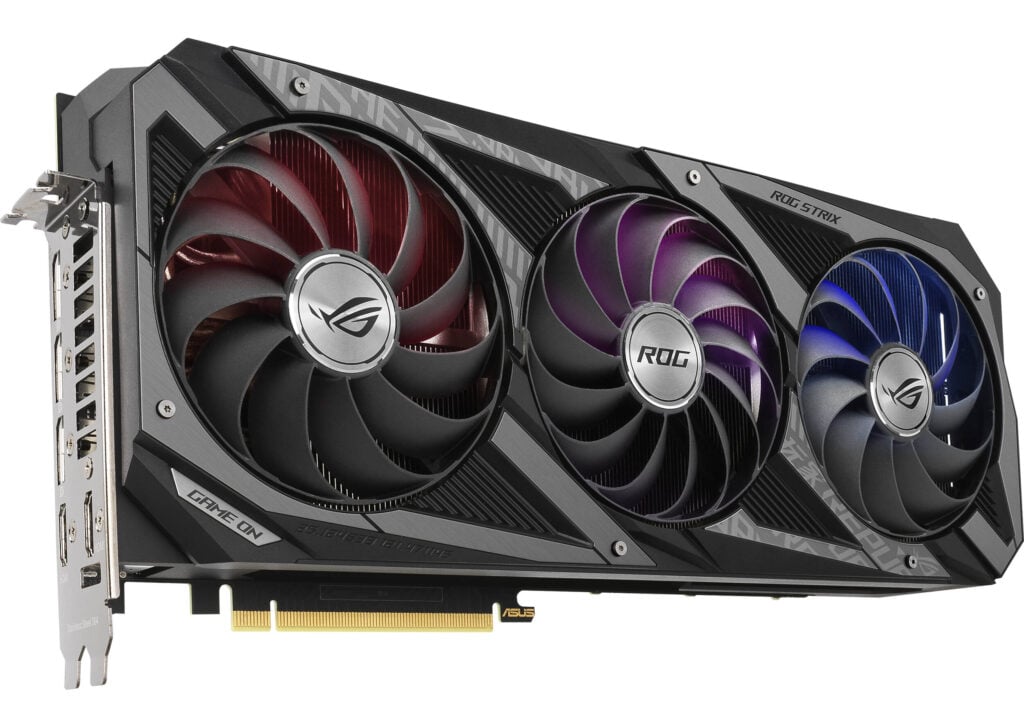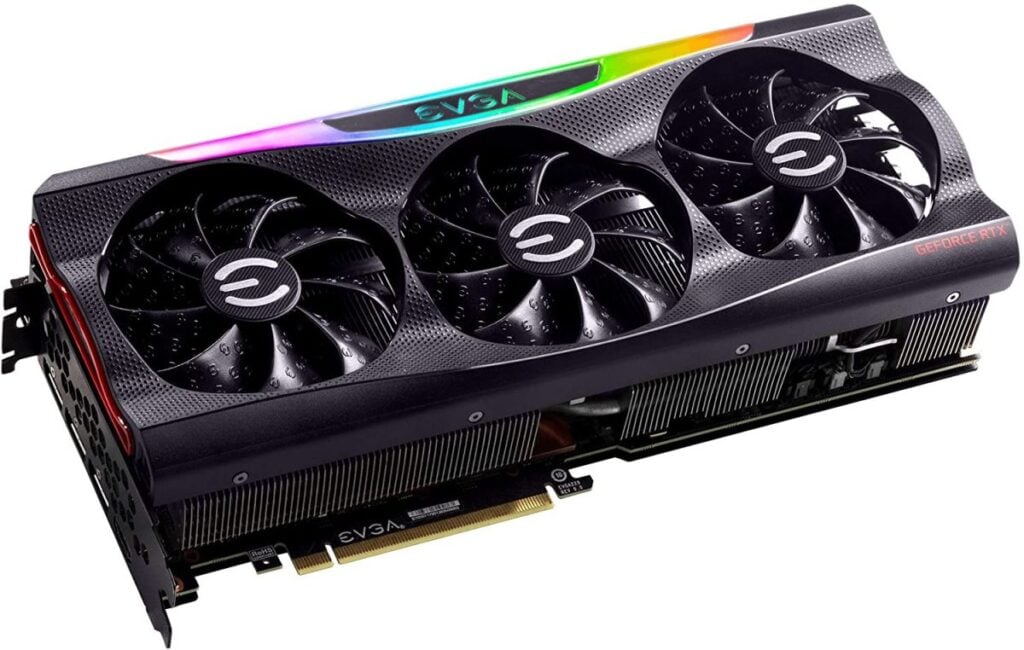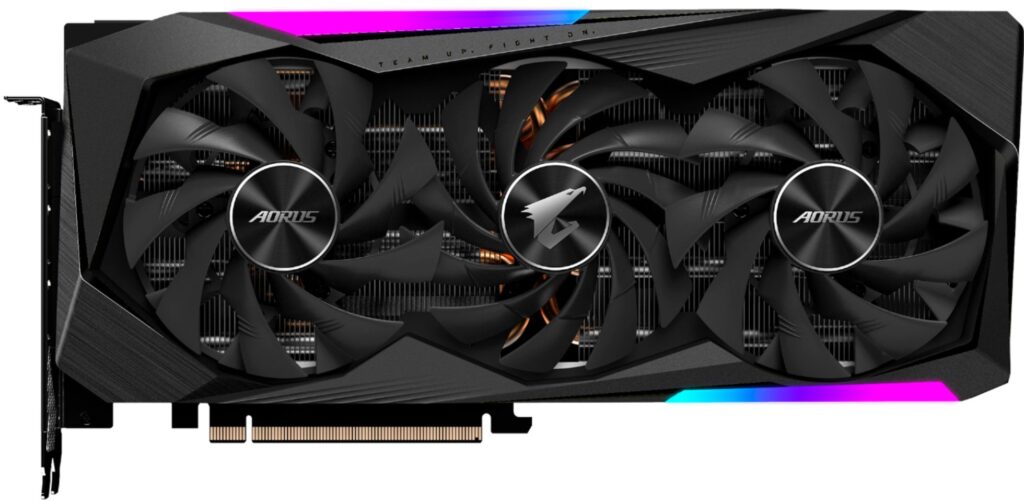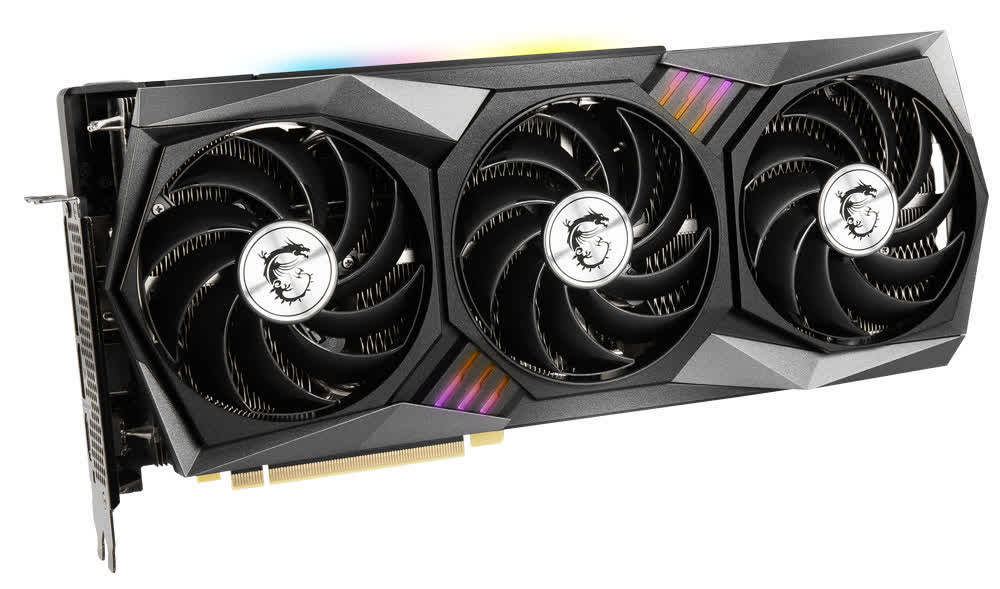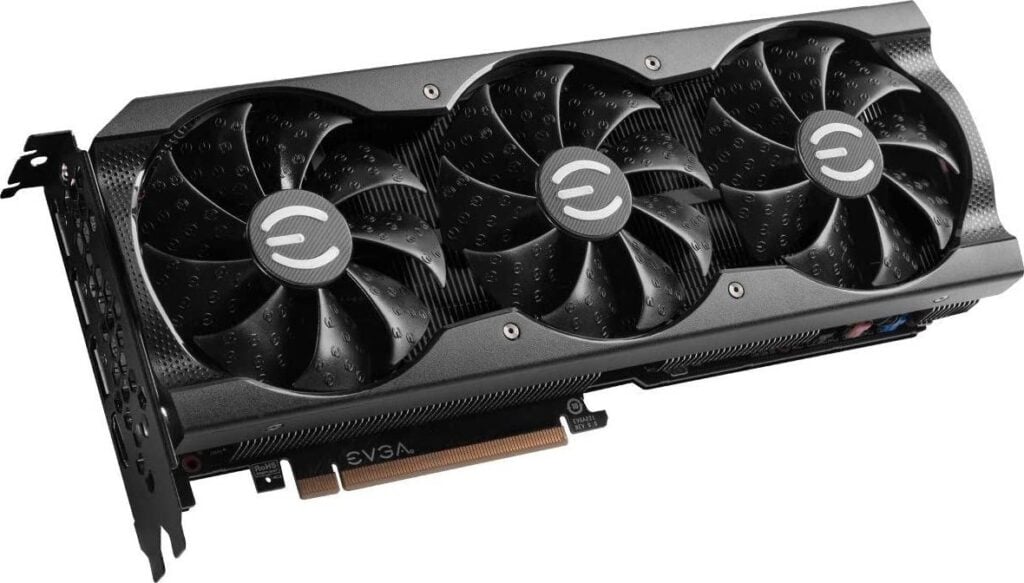On October 29th, 2020, Nvidia finally launched the much-anticipated GeForce RTX 3070 which was the third card in the RTX 3000 launch series based on the brand new Ampere architecture. Nvidia’s RTX 3070 was had garnered massive hype due to the fact that it was supposed to be on-par or faster than Nvidia’s previous-gen $1200 flagship, the Nvidia GeForce RTX 2080Ti. Well, come reviews, that was proven to be true and the RTX 3070 immediately became a fan-favorite among gamers who were looking for flagship performance but were not quite ready to rake out a whopping $1200.
Best RTX 3070 Graphics Cards: At a Glance
The availability of the new RTX 3000 series was shockingly poor though and people are still not able to go online and buy whatever variant they want as of the time of writing. The GPU shortage seems to be here to stay for a little while, however, we are assuming that potential buyers would be able to buy their preferred variant of the RTX 3070 sometime in the future. Therefore, it is vital that they are able to gather information about the various options on the market before finalizing their purchase decision. Keeping that in mind, here are our picks for the 5 best RTX 3070 graphics cards in 2021. The ASUS ROG Strix is ASUS’s flagship variant of graphics cards and it has always been one of the highest performing variants of any card out there. That has not changed with the ASUS Strix RTX 3070 with the card providing exceptional performance not only in terms of the thermals but also in the category of acoustics as well. The card is physically imposing and is in fact one of the largest RTX 3070 variants out there. The chassis is well built with a solid construction, premium materials, and impressive design elements that give the card its characteristic “pc gaming” aesthetics. You also get a high valued, Boost Clock of 1755 Mhz, which can really turn things around.
As for the cooling system, this is where the Strix excels the most. ASUS has included a pretty beefy cooling solution with the Strix that includes the newly introduced Axial Fan design that includes extra fan blades to improve fan stability and lower noise. The cooler and fans are of course using the downdraft style in this configuration. The central fan also spins in the opposite direction to the two outer fans which is supposed to decrease turbulence. The Axial fans’ blades are joined to an outer continuous rim that contributes to the stability of the fan and also aid in directing the airflow through the heatsink in a channeled way. Speaking of the heatsink, the massive 2.9-slot design of the Strix allows for a pretty beefy heatsink with a large heat dissipation area and a Max Contact heat spreader according to ASUS’s branding. In fact, the heatsink is so big and heavy that the card can run without spinning its fans at idle or at lighter loads, which reduces the noise of the card and improves the lifespan of the fans. The fans do spin under load though, but the noise level is still reasonably comfortable due to the impressive fan technology and the bulky heatsink. ASUS has used a custom PCB in the Strix but has maintained the smaller size that Nvidia has specified for the RTX 3000 series, making it possible to implement the flow-through design of the cooler with ventilation holes on the backplate as well. Aesthetically, the card delivers again. Not only does the card feature a premium industrial look, but the full-length aRGB strip looks fantastic on the side of the Strix and can be controlled via the AuraSync software. The card also features a factory overclock of 30 MHz, which is kind of underwhelming for a card that charges a premium over the MSRP. However, users can overclock this card pretty easily due to its massive power budget and impressively high power limit. Moreover, the card features Dual BIOS support as well which can be handy in BIOS flashing for extreme overclocks. Other RTX Card Reviews: Best RTX 3060 Graphics Cards Overall, the Strix RTX 3070 is an extremely impressive package and it does not offer any significant compromises except the price. That said, if money is no issue then the Strix should definitely be on the top of the list for you. Coming in with a considerable 90 MHz factory overclock, the EVGA FTW3 RTX 3070 aims to be the RTX 3070 that delivers on all fronts. Backed by EVGA’s excellent support network, gaming flair, and fan-favorite customer service, the EVGA FTW3 Ultra is their most premium variant that brings along a whole host of features. With the aforementioned factory OC, the boost clock of the card has been bumped to 1815 MHz which helps the FTW3 RTX 3070 extend its lead over the Founder’s Edition card as well as the RTX 2080Ti.
Featuring EVGA’s iCX3 technology, the extensive cooling system of the EVGA FTW3 delivers exceptional thermal and acoustic performance. With 9 sensors providing real-time data of the card’s temperature levels, the card has more than enough information to accurately tune the fan speed to provide the perfect balance of cooling and noise. As for the fans, the 3 fans in the EVGA FTW3 do spin in the same direction, however, the middle fan is offset by 10mm which helps to increase airflow coverage and decrease turbulence. Similar to the ASUS Strix, the backplate also features cutouts for airflow which allow the fans to push air straight through the heatsink to maximize performance. Speaking of the heatsink, it also includes some new features such as perforations in the heatpipes for increased airflow permeation. The card also features a big copper heat spreader that allows more extensive contact with the GPU die as well as the memory modules for maximum heat dissipation. The card is impressively thought out in terms of thermals, which is evident by the fact that even the backplate includes two heat pipes for cooling. The Boost Clock are high among average for this Graphics Card. One of the main strengths of the card is its overclocking potential. The card features an impressively high power limit and is also compatible with the renowned Precision X1 software, which includes data from the iCX3 sensors to accurately make decisions. There is also a dual BIOS option for extreme overclocking, as well as a PWM header to control a chassis fan according to the temperature of the FTW3 card. You can also manually tune your fan curve should you see fit. Related Read: Best RTX 2060 & RTX 2060 Super Graphics Cards Overall, the only drawback of this GPU might be its aesthetics and price. For some people, the asymmetrical fan design and the huge light bar take away from the look of the card rather than adding in it, and the price for the FTW3 puts it squarely against the very best variants out there. However, the EVGA FTW3 is a stellar performer and definitely a strong contender when it comes to the best RTX 3070 graphics cards. Gigabyte’s premium offering from the Aorus line is the Nvidia GeForce RTX Aorus Master RTX 3070. The main feature of the Aorus Master is its impressively high factory overclock which takes the overall boost clock of the card to 1845 MHz. This is even higher than the EVGA FTW3 and the ASUS Strix variants. Aorus aims to strike on multiple bases at once with the Master RTX 3070 and they more or less manage to do just that. Got any demanding games to play? this is all you need. Besides, you also have the amazing RGB Lighting.
The Aorus Master features Gigabyte’s extensive cooling solution known as Max Covered cooling. The most interesting design choice with this cooling solution is the fan alignment. The fans overlap each other to improve the airflow over the heatsink, which gives it a unique look. Aorus has also employed the technique where the central fan spins opposite to the outer two, which aids to reduce turbulence. Coming to the heatsink itself, it is massive although not as big as the top two variants, coming in at 2.7-slot width for the card. The fins of the heatsink are angular which increases the surface area for heat dissipation when the 3 fans channel air through them. Again, following the standard procedure, Gigabyte has included a large copper baseplate that takes heat away from the GPU die and the memory modules and transfers it to the heat pipes for dissipation. The flow-through design with the shorter PCB is also implemented in this Graphics Card. The cooling performance of the card is impressive and does not raise any alarms. The power budget of the card is sufficiently high to allow good overclocking, and the card does feature a Dual BIOS feature to further deploy a safety net for extreme overclockers. One of the most unique features of the Gigabyte card is the I/O configuration. The Aorus Master features 3 HDMI and 3 DisplayPorts that can be useful to people with loads of monitors. Related Read: Best RTX 2080 & RTX 2080 Super Graphics Cards. Aesthetically, the Aorus Master looks really good, with a well-designed shroud and decent RGB implementation. The RGB can be configured with Gigabyte’s RGB Fusion 2.0 software. The card is 2.7-slot and 29 cm long which will allow it to fit in many more cases than the bulkier cards. The metal backplate also adds to the rigidity and the overall look of the card. The Lighting of the card not PC Case Lighting adds to the looks quite well, which is not an easy feat to achieve. The Aorus Master is a robust offering from Gigabyte that delivers on most grounds. Not only does it feature a high factory OC, but it also delivers excellent thermal and acoustic results, making it another attractive offering to potential RTX 3070 Graphics Cards Buyers. One of the most expensive offerings out there, the MSI Gaming X Trio RTX 3070 charges a big $59 price premium over the MSRP of the RTX 3070, which is quite a high price bump. Undoubtedly, MSI has delivered a premium card as well at the price point, but the unreasonably high price premium bumps it down to fourth in our top 5 picks. The MSI Gaming X Trio features a hefty factory overclock which takes the final boost clock of the card to 1830 MHz. MSI’s offering is only a bit behind the Aorus Master and even beats the EVGA FTW3 in this department.
Employing MSI’s Tri Frozr 2.0 thermal system, the Gaming X Trio features 3 Torx 4.0 fans with dual-linked fan blades that provide a lot of airflow efficiently over the massive heatsink. The heatsink features a unique curved fin design that aims to optimize and effectively use the airflow from the fans to increase heat dissipation. The fans also stay reasonably quiet even under load. Aesthetically, the Gaming X Trio does not disappoint. The card features a diagonal RGB strip which can look phenomenal if the card is mounted vertically. The RGB can be effectively controlled using MSI’s Mystic Light software. The design overall has not changed drastically from the previous generation such as the MSI Gaming X Trio RTX 2080, but there are still tweaks here and there that refine the design a bit more. You only have slight touch of RGB Lighing though. The card itself is pretty hefty, weighing in at 1441g and measuring 323mm in length so case clearance can be an issue. MSI has increased the power budget of the card by 20W but this does limit the overclocking headroom of the card. Overall though, the MSI Gaming X Trio is a fantastic all-rounder in terms of features and cooling performance, but it comes at a big premium which knocks it down to fourth place in our top 5 roundups for the best RTX 3070 variants. The second entry from EVGA in our roundup is not aimed at the enthusiast crowd, but rather at the mainstream audience and aims to deliver a no-frills experience. The EVGA RTX 3070 XC3 Ultra does not include any extra bells and whistles in order to cut costs but still manages to deliver good cooling and acoustic performance. The XC3 also features a notable factory OC of 45 MHz which takes its overall clock speeds go to 1770 MHz. Still, Nvidia’s GPU Boost Algorithm will take care of auto-OC so that’s not much of a worrying sign. It is half the price for many. Again, don’t let the clock speed discourage you.
While the iCX3 solution of EVGA does exist on the XC3 as well, it does not include all the features that were included on the FTW3 card. The number of sensors is reduced as a cost-saving measure, although the same fans are included in the XC3 Ultra as well. The thermal and acoustic performance of the XC3 Ultra is great as well since it uses almost similar heatsink and Heatpipe technology as the FTW3 Ultra. The backplate also features multiple cutouts which enable the flowthrough cooling solution as well. Overclocking can be done using the Precision X1 software in the XC3 Ultra as well, however, the power budget may be limited. The RGB is not as flashy as the FTW3 and is restricted to the EVGA Logo in the XC3 Ultra. This may be a good choice for those who do not like flashing lights in their system. Moreover, the card features a 2.2 slot design which further improves case compatibility. Of course, there is Triple-Fan Cooling Solution. Keep in mind, we haven’t included compact graphics cards, since they lack performance and cooling. If you have a small Gaming PC, and you want to fully focus on gaming mode, then do not compromise with sizes. These days PC Gamers are looking forward to better looking GPU’s anyway. Related Read: Best RTX 2070 & RTX 2070 Super Graphics Cards. The EVGA XC3 cuts down on some extra features like RGB and intricate sensors to deliver a really solid card at a reasonable price point. At the time of writing the XC3 costs $40 over the MSRP which, although reasonable, puts it squarely in competition with other offerings from brands like ASUS with the TUF series, and that should factor into the decision of the potential buyer as well. The incredible performance really tops it though.
Factors To Consider While Buying
Since the RTX 3070 is a high-end GPU from Nvidia’s Ampere lineup, there are certainly a lot of AIB partner cards available for it on the market. However, not all variants of a GPU are created equal, as explored in our roundup today. It is important that you are armed with the knowledge of how to differentiate between different AIB variants and what exactly to look for when making a purchase decision for an RTX 3070. In order to get the best RTX 3070 card for your particular use case, you have to consider the following factors.
Thermal Performance
Generally, a cooling system on a graphics card is considered acceptable if it is able to dissipate the heat that the internal components such as the GPU die, the memory modules, and the VRM components are generating. Since the RTX 3070 is quite a powerful card, you can expect its internals to generate a lot of heat under load, a variant with a sizeable heatsink and efficient thermal solution should be preferred. This becomes even more important if you plan on installing the GPU in a compact micro-ATX or mini-ITX case. Acoustic performance is another factor you should consider, as most AIBs are now putting very quiet fans on their premium models that do not ramp up unless they absolutely need to. 0dB technologies are also becoming commonplace, so you should keep that in your preference as well.
Aesthetics
The looks and styling of a card are a very subjective matter, and everyone has a different opinion on it. Some users do not care one bit about how the card looks as they only seem to care about performance, while others take note of every little design detail and RGB implementation on the card in order to blend it perfectly into their PC builds. Both approaches are perfectly fine, as this is a subjective matter. However, since the Nvidia GeForce RTX 3070 is a high-end card, you might want to also look for some of the best RTX 3070 models when it comes to aesthetics alone. RGB Enthusiasts will love it, the implementation is another factor in this category that should be considered beforehand, and you should also consider vertical mounting options in order to enhance the overall look of your PC build. Surely, these two factors are not the be-all and end-all of the whole purchasing process, but they do represent some of the more important steps. One should also consider other factors such as the OC Mode headroom of the card, and the TDP, TGP, and TBP ratings of the GPU that would give you a better idea of the expected power consumption, etc. These factors would certainly help in purchasing the best RTX 3070 graphics card that would complement your build in the way that you desire. The Nvidia GeForce RTX 3070 shall work for nearly most future games coming out in the next two to three years.
NVIDIA 3070 Ti Positioned Between RTX 3070 and RTX 3080 To Compete With AMD…To No One’s Surprise, Some of the New RTX 3070 Ti Laptop GPUs Are Actually…NVIDIA At CES 2022: RTX 3090 Ti, $249 RTX 3050, RTX 3080 12GB and RTX 3070 Ti…NVIDIA Announces its New Services & Cards with Ampere Architecture: The RTX…












